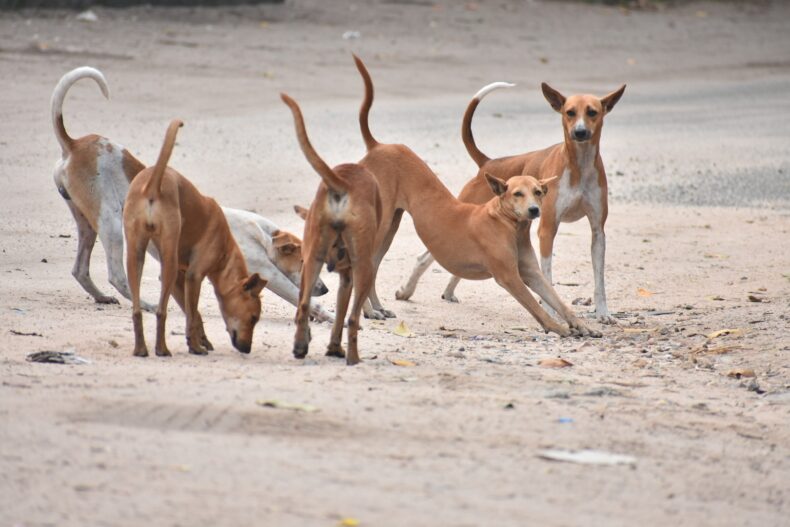
As I was researching and writing DOG SMART, trying to understand what it means to think like a dog and experience the world as a dog, I had an epiphany of sorts: Dogs around the world wandering the streets—the “village” dogs you are bound to see roaming here and there, often with a few pals, if you travel outside of the Western world—are living a legitimate life for dogs. In fact, I imagine they are very much like the proto-dog who, thousands of years ago, learned to tolerate our human ancestors just enough to take advantage of them and get what they needed (nibbles at the trash heap, maybe a handout or two, even shelter in an unseen corner of a dwelling) while staying at the periphery of the peopled spaces. Those becoming the most tolerant of their two-legged co-residents, of course, would have had the chance to be healthier and longer lived, with more successful reproduction, thus moving the needle on domestication and the pathway to our beloved pets.
So even if that pet life is luxurious by comparison, a dog’s life doesn’t have to be the one we provide. Why do we see those “unhomed” dogs’ experience as illegitimate, unacceptable, or just plain wrong? It looks hard, I’ll give us that, and it doesn’t match what we want for the animals, what we think they need. And street dogs can be problematic when they carry/spread disease or bite kids or displace wild animals. But those skinny, itchy, wary pups are, as I like to say, dogs uninterrupted, dogs doing all the things dogs want to do naturally with no one pulling them back. These are animals thinking for themselves and making choices, doing what they must to survive, rolling and humping and barking when the need arises or the mood strikes.
Just to be clear, I’m not talking about strays—dogs that were living a pet’s life and then suddenly were lost out in the world, happy to return to their people given the chance. And like any animal lover, I am distressed by dogs that are “kept” but used or mistreated; they are stuck in a terrible spot, suffering at the hands of people who should never have an animal under their control, hard stop. The dogs have no agency to change their circumstances. It’s unacceptable.
But the dogs for whom the street is and always has been home: This is something else. And there are hundreds of millions of them; in many places they are considered a natural part of the landscape. In fact, the vast majority of dogs exist in this way, unleashed, unfenced, following only canine rules, participating in a sort of glorious, albeit flea-bitten, freedom.
It’s a hardscrabble life, being “out there” struggling to survive, and typically its not a long one. I understand the urge to want to scoop up the world’s village pups and scrub them down and take them home and fatten them up. But in doing so, wouldn’t we be stripping them of their dogness? From the dog’s perspective, is it a fair trade, freedom for a couch and kibble?
Perhaps for some. But not all. If you are Canis familiaris, hardscrabble can be all that you know. And for an animal as adaptable, dare I say as smart, as a dog, I think that’s absolutely okay.
Where I live now, people are always reporting stray dogs and cats. Previous resident most folks had outdoor dogs. Since I had a pond they would all come around for quick escape from the summer heat. Most of the out door dogs got some kind of mange and after 3 years or so I wouldn’t see them anymore. At night a coyote would come thru the neighborhood and set of a call of the wild. I kind of miss them wild pets.
I agree , Jennifer. They seem so naturally fitted to life in the “wild” and in a gang (tribe, clan, belonging). Reminds me of the happiest years of my own life: living in my pickup camper traveling the West as an avid rock climber in love with the natural world. Often dirty, alone, eating poorly, with a tribal clan of belonging not far away at all.